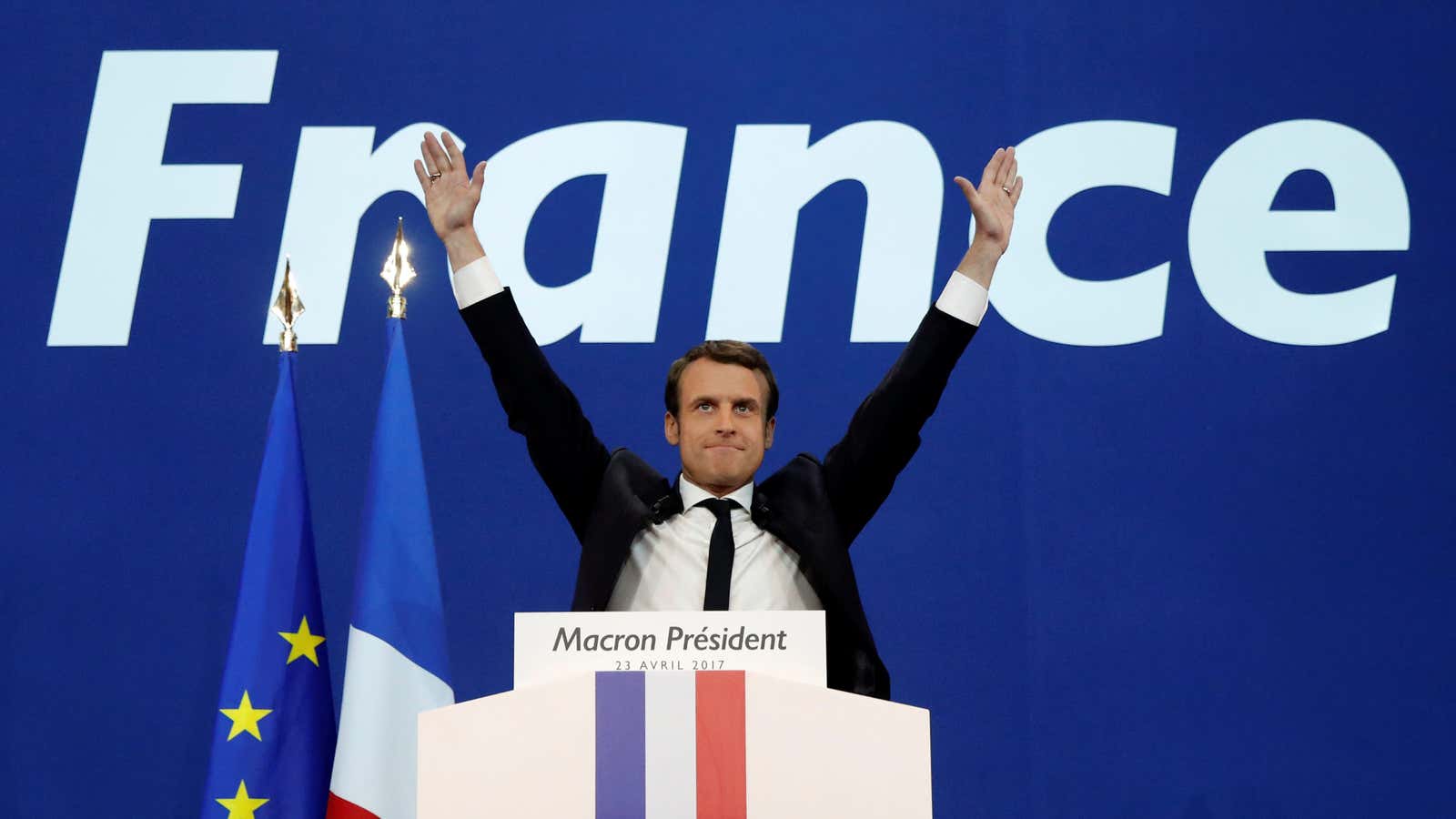France has a long history of claiming to be a credible alternative to the American model of democracy. For the first time in a very long time, this claim can be taken seriously. As it comes to an end in two weeks, the French presidential race will lead to one of two outcomes: If Marine Le Pen is elected, it will be the end of the European Union as we know it; an earthquake following the mere tremor of Brexit. But if the victor is Emmanuel Macron, France’s story will be an unexpected rise from the ashes to become the continent’s most interesting political experiment, and the new beacon of European, Atlantic, and progressive values.
The good news is that Macron, a 39-year-old reformist Europhile whose political movement didn’t exist just over a year ago, has a very serious chance of becoming president of one of the Western world’s most decrepit and over-centralized gerontocracies. The bad news is that 70% of French voters yesterday cast their ballot in favor of candidates whose discourse is either proto-Marxist, national-populist, or more or less openly Putinophile, if not a combination of the three.
The final round of voting to determine the presidency is on May 7. Here are three reasons you should not take the results of the second round for granted:
First, Le Pen has been largely successful in casting the present ideological contest as a struggle between elite, privileged globalists—supporters of what she sees as the dictatorship of Brussels—and the “real” masses of French people on the other. Journalist David Goodhart has aptly described the split as between the mobile “achieved” identity of the people from Anywhere, and the marginalized, roots-based identity of the people from Somewhere. This schism, which accounts for the Brexit vote and the election of Donald Trump, will play a role in France, too: Voters for the Chavez-like revolutionary Jean-Luc Mélenchon will be tempted to vote for Le Pen in the second round, especially because he has refused to throw his support to Macron.
Second, the polarization of politics in France will mean that the so-called “21 Avril” effect from April 2002, which saw Le Pen’s father come in second in the first round of the presidential election, will not be as significant. His opponent Jacques Chirac earned 82% of the vote in the second round. Although conservative candidate François Fillon has called on his supporters to vote Macron in the second round after losing out yesterday, an undetermined number of them will be tempted to vote for the far right. The conservative Catholic movement “Sens Commun,” which had supported Fillon, has also refused to call (link in French) on its members to vote for either Macron or Le Pen.
Finally, the role French Muslims will play in deciding who will run the country for the next five years will be crucial. This might sound like good news for Macron, who a few months ago called France’s colonization of Algeria a “crime against humanity.” Unfortunately, for the vast majority of young people who identify as Muslims in France, Islam has long ceased to be about religion and has instead become a question of ideas, identity, and politics. To be a Muslim in France these days is to be the victim of constant discrimination: It’s to have the compatibility of one’s religion with democracy be constantly questioned by three groups: the far right, fundamentalists of their own faith, and those who could be arguably called hysterical secularists. While the nefarious influence of the former two is obvious, the damages caused by the latter are often underestimated.
In the name of a parochial understanding of secularism (France’s sacrosanct “laïcité”), the French Republic refuses to allow its citizens to be counted according to religious or ethnic background. It is illegal in France to compile such statistics, and no official data exists on the exact nature of the plight of Muslims in France. As a result, nothing is really done to improve the lives of French Muslims specifically, and many believe there is a statewide institutional bias against them.
As a result, a substantial number could engage in one of the self-detrimental and perplexing electoral behaviors of our time: voting against their interests. After all, poor and lower-middle-class Americans just elected a billionaire to office so he can lower taxes for the rich and repeal the closest thing Americans have ever had to universal healthcare.
Indeed, following Macron’s declaration that “anti-Zionism leads directly to anti-Semitism,” calls from Muslims on social media to not vote for Macron abound. So, a still-undetermined number of French Muslims will either not vote—or will vote for the leader of one of the most rabidly Islamophobic parties in all of Europe.
